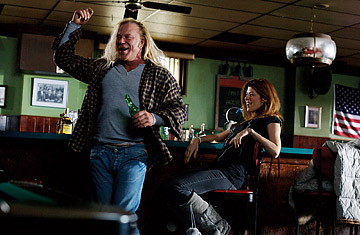
Mickey Rourke and Marisa Tomei in The Wrestler
(2 of 2)
Slipping a Mickey
I speak as one who invested early in Rourke futures. Reviewing Barry Levinson's 1982 buddy comedy Diner for TIME, I wrote that "the prize in this gallery is Mickey Rourke, who made a strong impression in Body Heat and assumes command of Diner whenever he is onscreen. With a face as handsome as it is streetwise, and a smile that manages to be both shy and cunning, Rourke has the potential of a young Jack Nicholson."
Soon he started making good on my bet. Within a few years, Rourke had won starring roles in a bunch of fascinating weirdies: Francis Coppola's Rumble Fish (Mickey was Motorcycle Boy), The Pope of Greenwich Village, Michael Cimino's Year of the Dragon, the S&M erotic drama 9 1/2 Weeks, the satanic thriller Angel Heart (De Niro was the Devil), as a gangster in Elephant Man makeup in Johnny Handsome and a lowlife genius in a film of Charles Bukowski's Barfly. The guy was sexy, dangerous, adventurous in his choice of roles. The actor's cliché "totally committed to the process" could have been coined for Rourke.
But that was the '80s, when directors still wanted to hire him. He pissed away what should have been his prime by curling inside the legend of the Difficult Star, acquiring an odor for being rowdy and unreliable. And since he wasn't a box-office magnet, why take the chance? Bio stats on the Internet Movie Database synopsize Rourke's '90s: "Turned down Bruce Willis' role in Pulp Fiction ... Filmed a role in [Terrence Malick's] The Thin Red Line that eventually got cut ... Walked off the set of Luck of the Draw when the producers refused to let him include his pet chihuahua in the movie." Instead, Rourke, who had been a serious amateur boxer as a teenager, went professional, submitting himself to the rigorous training, abuse and combat that would pay off in The Wrestler. The face he wears in the movie came from those years in the ring, plus some plastic surgery that didn't work out quite as Rourke had hoped.
This decade he did a swell turn, again under a ton of makeup, as a vengeful ex-con in the Robert Rodriguez–Frank Miller Sin City. On his few forays into late-night talk (one visit with David Letterman sticks in my mind), the host would breathe a sigh of relief to find Rourke roguishly charming; the bull hadn't demolished the china. But mostly his rep kept him MIA. When he came up for the role of Randy, he recalled in Venice, Aronofsky told him: "You're a really great actor, and you've just f______ up your career for 15 years and nobody wants to hire you."
In a movie landscape where the blockbusters (and some of the best films) rely heavily on special effects that make the most fantastic creature look and feel real, The Wrestler offers the compelling sight of an actor who is his own special-effect monster, his own Incredible Hulk. (It's the rare movie where the closing credits for makeup and Mr. Rourke's trainer are well deserved. Mr. Rourke's plastic surgeon may also have earned a mention.) Reviewers love watching actors abuse their bodies for their art almost as much as actors love doing it. That's one reason Mickey should be a guest of honor at the year-end critics' awards dinners. Another is that Rourke's bio blends with the story of The Wrestler, but with a happier ending. His career has come back from the dead; any award would be like a posthumous prize to someone who is, miraculously, still around to accept it.
The real cause for celebration is that he alchemizes the dross of the script into a character with a palpable physicality and inner life. Behind the bulk of his hulk, a man's dogged decency is on display, and so, briefly, is Rourke's fallen-angel smile. In the scene that could cinch his Oscar nomination, he gets a long close-up as Randy pours out his clumsy love for his daughter. The speech is boilerplate sentiment, which the actor — who says he reworked it to reflect his own life — elevates to a passion as sweet as it is forlorn. (The speech is up there with the one Jean-Claude Van Damme, another comeback kid of 2008, gives in his quasi-autobiographical JCVD.) If Rourke had to punish himself to look the part of a battered fighter so he could slip inside Randy's wounded innocence, then, man, it was worth it.
So even someone like me, who knows in his bones that The Wrestler is bogus, can cheer the return of Mickey Rourke. And not because it's nice that he seems to have turned his life around and focused again on doing what he once did so well — but because the best writers and directors might have to put Rourke on the short list of actors up for great roles. The man from the past has a future again.
